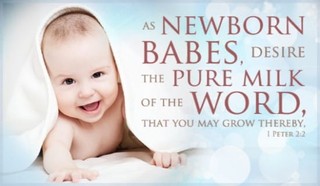
Change Translation
- Recent Translations
- All Translations
Images for Kefa I 2
Kefa I 2 Commentary
Chapter 2
A temper suitable to the Christian character as born again, is recommended. (1-10) Holy conversation among the Gentiles directed. (11,12) Subjects exhorted to pay all proper obedience to their civil governors. (13-17) Also servants to their masters, and all to be patient, according to the example of the suffering Saviour. (18-25)
Verses 1-10 Evil-speaking is a sign of malice and guile in the heart; and hinders our profiting by the word of God. A new life needs suitable food. Infants desire milk, and make the best endeavours for it which they are able to do; such must be a Christian's desires after the word of God. Our Lord Jesus Christ is very merciful to us miserable sinners; and he has a fulness of grace. But even the best of God's servants, in this life, have only a taste of the consolations of God. Christ is called a Stone, to teach his servants that he is their protection and security, the foundation on which they are built. He is precious in the excellence of his nature, the dignity of his office, and the glory of his services. All true believers are a holy priesthood; sacred to God, serviceable to others, endowed with heavenly gifts and graces. But the most spiritual sacrifices of the best in prayer and praise are not acceptable, except through Jesus Christ. Christ is the chief Corner-stone, that unites the whole number of believers into one everlasting temple, and bears the weight of the whole fabric. Elected, or chosen, for a foundation that is everlasting. Precious beyond compare, by all that can give worth. To be built on Christ means, to believe in him; but in this many deceive themselves, they consider not what it is, nor the necessity of it, to partake of the salvation he has wrought. Though the frame of the world were falling to pieces, that man who is built on this foundation may hear it without fear. He shall not be confounded. The believing soul makes haste to Christ, but it never finds cause to hasten from him. All true Christians are a chosen generation; they make one family, a people distinct from the world: of another spirit, principle, and practice; which they could never be, if they were not chosen in Christ to be such, and sanctified by his Spirit. Their first state is a state of gross darkness, but they are called out of darkness into a state of joy, pleasure, and prosperity; that they should show forth the praises of the Lord by their profession of his truth, and their good conduct. How vast their obligations to Him who has made them his people, and has shown mercy to them! To be without this mercy is a woful state, though a man have all worldly enjoyments. And there is nothing that so kindly works repentance, as right thoughts of the mercy and love of God. Let us not dare to abuse and affront the free grace of God, if we mean to be saved by it; but let all who would be found among those who obtain mercy, walk as his people.
Verses 11-12 Even the best of men, the chosen generation, the people of God, need to be exhorted to keep from the worst sins. And fleshly lusts are most destructive to man's soul. It is a sore judgment to be given up to them. There is a day of visitation coming, wherein God may call to repentance by his word and his grace; then many will glorify God, and the holy lives of his people will have promoted the happy change.
Verses 13-17 A Christian conversation must be honest; which it cannot be, if there is not a just and careful discharge of all relative duties: the apostle here treats of these distinctly. Regard to those duties is the will of God, consequently, the Christian's duty, and the way to silence the base slanders of ignorant and foolish men. Christians must endeavour, in all relations, to behave aright, that they do not make their liberty a cloak or covering for any wickedness, or for the neglect of duty; but they must remember that they are servants of God.
Verses 18-25 Servants in those days generally were slaves, and had heathen masters, who often used them cruelly; yet the apostle directs them to be subject to the masters placed over them by Providence, with a fear to dishonour or offend God. And not only to those pleased with reasonable service, but to the severe, and those angry without cause. The sinful misconduct of one relation, does not justify sinful behaviour in the other; the servant is bound to do his duty, though the master may be sinfully froward and perverse. But masters should be meek and gentle to their servants and inferiors. What glory or distinction could it be, for professed Christians to be patient when corrected for their faults? But if when they behaved well they were ill treated by proud and passionate heathen masters, yet bore it without peevish complaints, or purposes of revenge, and persevered in their duty, this would be acceptable to God as a distinguishing effect of his grace, and would be rewarded by him. Christ's death was designed not only for an example of patience under sufferings, but he bore our sins; he bore the punishment of them, and thereby satisfied Divine justice. Hereby he takes them away from us. The fruits of Christ's sufferings are the death of sin, and a new holy life of righteousness; for both which we have an example, and powerful motives, and ability to perform also, from the death and resurrection of Christ. And our justification; Christ was bruised and crucified as a sacrifice for our sins, and by his stripes the diseases of our souls are cured. Here is man's sin; he goes astray; it is his own act. His misery; he goes astray from the pasture, from the Shepherd, and from the flock, and so exposes himself to dangers without number. Here is the recovery by conversion; they are now returned as the effect of Divine grace. This return is, from all their errors and wanderings, to Christ. Sinners, before their conversion, are always going astray; their life is a continued error.
Kefa I 2 Commentaries
Chapter Summary
INTRODUCTION TO 1 PETER 2
This chapter consists of exhortations, in general, to a holy life; and, in particular, to obedience to superiors. It begins with an exhortation to lay aside various vices, which were unbecoming regenerate persons, 1Pe 2:1 and, agreeably to their character, as new born babes, to express a desire after the Gospel, which is commended from its nature, being comparable to milk; and from its quality, being reasonable, sincere, and unmixed; and from the end and usefulness of it, a spiritual growth; and the argument engaging to such a desire is the experience they had of the grace of Christ in it, 1Pe 2:2,3 whose excellency is declared, under the metaphor of a stone, said to be living, to be chosen of God, and precious to him, though rejected by men; to whom the saints are encouraged to come, as lively stones built up, a spiritual house, for the exercise of the holy office of the priesthood, by offering up spiritual sacrifices acceptable to God through Christ, 1Pe 2:4,5 and that Christ is such a precious stone, is proved from Isa 28:16 and not only to God, but to all them that believe; though to them that believe not, he is the stone of rejection, stumbling, and offence; to stumble at which, and the doctrine of it, through disobedience, they were of old appointed by God, 1Pe 2:6-8 but the character of the persons the apostle writes to was very different, quite the reverse, being chosen and called, and manifestly the people of God, and sharing in his grace and mercy, 1Pe 2:9,10 and these he exhorts, suitable to their state and condition, to abstain from sin, as an enemy to their souls, and to live an honest life and conversation among the Gentiles, that they, instead of speaking evil of them, might, by beholding their good works, glorify God, 1Pe 2:11,12. And particularly he exhorts them to obedience to civil magistrates, both superior and inferior; partly from the author of them, they being of the Lord; and partly from the usefulness of them to punish wicked men, and to encourage good men; and also from its being the will of God, by such obedience, to silence the cavils of foolish men, 1Pe 2:13-15. And whereas it might be objected, that they were made free by Christ, and therefore should not be the servants of men; it is granted, that they were free; but then it is denied, that they should use their liberty for a cloak of maliciousness: and besides, it should be observed, that they were the servants of God, and therefore ought to do what he enjoined them; and, among other things, yield obedience to civil magistrates, 1Pe 2:16. And to this purpose are various exhortations in 1Pe 2:17, and another particular one is added, which is to servants, to be subject to their masters, and fear them, whether they be good or bad, 1Pe 2:18 and then he comforts such that had bad masters, and encourages them to bear the injuries they received from them patiently; because so to do was grateful to God, and acceptable in his sight; and because they were called unto it by him; and because of the example Christ had left them in suffering for them, 1Pe 2:19-21. And this is further urged from the character of Christ, who was without sin, and yet suffered, and from his conduct, who, when reviled, made no return, but left his cause with God, 1Pe 2:22,23 which leads on the apostle take notice of the nature of Christ's sufferings in his body on the cross, and the ends of them, which were expiation of sin, healing diseases, and holiness of life, as a consequent thereof, 1Pe 2:24 previous to which conversion, which is illustrated by the former state and condition men are in, being as sheep going astray; and by their present one, being returned to Christ, the Shepherd and Bishop of souls, 1Pe 2:25.
Study Tools
PLUSUnlock Notes
This feature is for PLUS subscribers only. Join PLUS today to access these tools and more.
JOIN PLUSUnlock Highlights
This feature is for PLUS subscribers only. Join PLUS today to access these tools and more.
JOIN PLUSUnlock Bookmarks
This feature is for PLUS subscribers only. Join PLUS today to access these tools and more.
JOIN PLUSTrack Your Reading
Create a free account to start a reading plan, or join PLUS to unlock our full suite of premium study tools.

